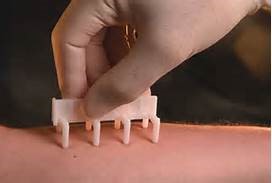What Is an Allergy Skin Test?
Allergy tests help figure out what may be causing allergy symptoms. Something that triggers an allergy symptom is called an allergen. Knowing what triggers allergy symptoms can help to avoid those triggers. Allergy tests may be done to evaluate:

- food allergies.
- triggers for asthma patients.
- drug allergies.
- environmental allergies, like hay fever.
- eczema.
- venom allergy to wasp, bee or hornet stings.
What Do I Need To Do To Prepare for an Allergy Skin Test?
Allergy skin tests can only be done if antihistamines have been stopped for 3 days before the visit. These are the medicines that need to be stopped:
- Allegra (fexofenadine)Atarax (hydroxyzine)
- Benadryl (diphenhydramine)
- Claritin (loratadine)Clarinex (desloratadine)
- Xyzal (levocetirizine)Zyrtec (cetirizine)
- Nasal sprays – Astelin, Astepro, Panatanse
- Eye drops – Bepreve, Zaditor (ketotifen), Patanol, Pataday, Pazeo
- Cough and cold medicines
- Cyproheptadine (Peractin) may need to be stopped for 2 weeks prior to testing.
- Some medicines that you inject may interfere with skin prick testing. Your provider will review your medicines and decide if skin testing is right for you.
What Are the Most Common Types of Skin Tests?
- Skin prick test. These tests are done on the back or forearm.
- A small amount of liquid allergen is put on a plastic applicator.
- The applicator is used to scratch the top layer of skin.
- No needles are used.
- Many allergens can be tested at one time.
Intradermal test. This test is done after the skin prick test if needed. It may find allergens that did not show up on the skin prick test and is done on the upper arm.
- A small amount of liquid allergen is injected just under the surface of the skin.
- A tiny needle is used, but it is not a shot.
- Penicillin, local anesthetics, and venom allergy can be tested this way.
- It takes less than 5 minutes to put the allergen on or under the skin. It takes about 20 minutes to see the results.
With both tests there may be some pain. The test spots may itch during and after the test but should not be touched for 15 minutes.
What Do I Need To Do To Prepare for an Allergy Skin Test?
Allergy skin tests can only be done if antihistamines have been stopped for 3 days before the visit. These are the medicines that need to be stopped:
- Allegra (fexofenadine)Atarax (hydroxyzine)
- Benadryl (diphenhydramine)
- Claritin (loratadine)Clarinex (desloratadine)
- Xyzal (levocetirizine)Zyrtec (cetirizine)
- Nasal sprays – Astelin, Astepro, Panatanse
- Eye drops – Bepreve, Zaditor (ketotifen), Patanol, Pataday, Pazeo
- Cough and cold medicines
- Cyproheptadine (Peractin) may need to be stopped for 2 weeks prior to testing.
- Some medicines that you inject may interfere with skin prick testing. Your provider will review your medicines and decide if skin testing is right for you.

Allergy skin tests should not be done if you:
- are sick with an infection or if your asthma is acting up.
- take Beta blocker medicine for high blood pressure, migraine headaches, or eye drops for glaucoma. Common names are: Propranolol, metoprolol, atenolol and Timoptic®, or Betoptic® eye drops.
- have a history of a severe allergic reaction to skin tests.
- had a severe full-body reaction (anaphylaxis) in the past 6 weeks.
- are pregnant.
- took any antihistamines in the past 3 days.
What Do the Results Mean?
The provider will review many things before deciding if it is a true allergy and will talk with you about the results.
- When there is a reaction, the size of the reaction spot will be measured. The provider will review the skin tests results and your history to decide if there is an allergy.
- Not all reactions are caused by an allergy. Sensitive skin or an active rash may cause a reaction that is not an allergy.
What Are the Risks During or After the Skin Tests?
There is a risk of reaction.
Mild. These can happen at the site of the allergy test. It may hurt or be red, swollen, or itchy. We expect a mild reaction to any positive allergens. You may be given Zyrtec (cetirizine) if you are uncomfortable. If the reaction gets bigger after you leave or lasts more than 24 hours, call the allergy clinic.
Serious. These do not happen often but can lead to death if they are not treated. Tell the nurse right away if you have any of the following:
- Hives. Rash, swelling, or itching of more than one part of the body.
- Swelling. Any part of the body, inside or out. This includes the mouth, tongue, and throat. It can be one or many parts of the body.
- Breathing problems. Shortness of breath, coughing, wheezing, or chest tightness.
- Other: Sneezing that does not stop, feeling dizzy, sick to the stomach, or just not feeling right.
Anaphylactic shock. This is rare but is the most serious allergic reaction. The above symptoms can lead to this. It can happen any time after the test is put on.
If there is a serious or anaphylactic reaction, emergency medicine will be given right away. The medicine is called epinephrine and comes in an Epi-Pen.




